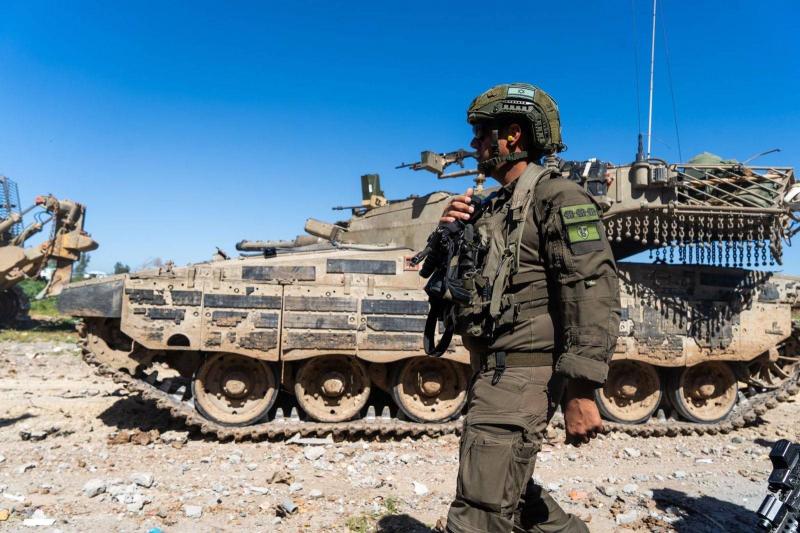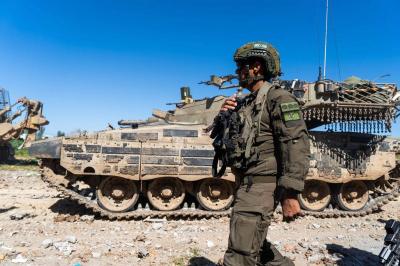Israel is negotiating through intermediaries on two fronts: Gaza and the "Hezbollah" front. In Gaza, there are proposals to end the "Hamas" movement and negotiate with it, while in Lebanon, negotiations with "Hezbollah" aim to eliminate its threatening presence to Israeli security. The mediators for Gaza consist of a stable trio: the United States, Egypt, and Qatar. For Lebanon, another trio includes the U.S., France, and German intelligence. The mediators have been working for months, yet there has been no expected progress toward a settlement that would halt the war and its proliferating ramifications.
The latest and most clear proposals were presented by U.S. President Joe Biden at the end of May. These proposals were claimed by the Israeli government to be its own creation and supported by a UN Security Council resolution, before detailed discussions on them were resumed. "Hamas" announced its response over a week ago, only for Israel to send the Director of the "Mossad" to Doha. He returned to discuss the resumption of negotiations days later.
As mentioned in Israel and among "Hamas" circles, the discussions are revolving around the "second phase" of Biden’s plan. "Hamas's" recent response to the mediators' offer, which was received by Israel, sparked a significant disagreement between Benjamin Netanyahu and heads of the security services and Defense Minister Yoav Gallant, who believe there is an opportunity to achieve a breakthrough in the negotiations. Netanyahu is weighing his personal benefit from the deal. If he goes to sign, he risks the collapse of his government under pressure from his "extreme" ministers, which would force him into early elections with an uncertain future. Not signing the deal would mean the continuation of the war and potentially the death of remaining Israeli hostages in Gaza, while also risking a large-scale explosion with "Hezbollah" in Lebanon.
Faced with these two possibilities, Israel continues to pursue its long-term overarching plan of total control over Palestinian territories in Gaza and the West Bank, working to manage and Judaize them through repression, annexation, and settlement, while undermining any future project to establish an independent Palestinian state. Over nine months of war, Israel has directly controlled 26% of the sector's land (after invading and destroying it). A journalistic investigation published by "Haaretz" indicates that this involves "talk of an effort for long-term occupation" via "resuming Jewish settlement in the sector." In the West Bank, the newspaper "Israel Hayom" discusses a "strategic plan" initiated by Minister Bezalel Smotrich through the Settlement Authority he created, aimed at preventing the establishment of a Palestinian state. The five settlements that were approved for construction last week by the government are seen as an initial step in a plan targeting the prevention of regional continuity for Palestinians in the West Bank.
These critical "details" do not enter the heart of the negotiations between "Hamas," which seeks to save its head, and Israel, which continues with its original project that does not recognize the basic rights of the Palestinian people. In the Doha negotiations, there is no place for anything other than hostages and the fate of "Hamas" in the sector!
On the "Lebanese" front, "Hezbollah" ties its fate to the negotiations that have been postponed session after session. Israel negotiates with "Hezbollah" even though it wants to end it just as it says about "Hamas." The American, French, and finally German envoys present an almost unique idea: to remove the party's fighters from the northern Israeli settlement borders with a promise to work on establishing the southern Lebanese borders. However, that does not suit "Hezbollah" and does not conform to the logic of its involvement in a war that is fundamentally not governed by purely Lebanese interests, which has proven, in terms of results, that it has not served the Palestinian struggle in achieving any gains.
"Hezbollah," which has built its justification for existence on liberating what remains of Lebanese land occupied in the Shebaa Farms and Kfarshouba hills, could have accompanied the "Flood of Al-Aqsa" with a swift operation to reclaim those territories, at a cost far lower than what it has paid in the ongoing war of attrition, ending with a victory and establishing Lebanon's historical borders. However, that would have forced it to end its armed role, which is practically the offer conveyed to it by the mediators, without considering its role in the Gaza war, and without finding support within Lebanon, which would have had a different stance if it had waged its battle under the banner of reclaiming occupied Lebanese land.
In the current context of the war and negotiations, it is difficult to anticipate a change in Netanyahu's government behavior leading to conclusive results regarding a ceasefire in Gaza, which would directly reflect on the "Hezbollah" front and other fronts in the resistance axis. It is also hard to expect a change in the rhetoric of the axis fighting Israel from Lebanon and Gaza. The new element in the position was Iran's threat to intervene directly if Israel attacked "Hezbollah" in a major operation. Iran did not take such a stance after Israel attacked and devastated Gaza. Its stance reveals its priorities in preserving "Hezbollah" rather than Palestine. In this sense, Palestine occupies a position secondary to the Iranian Shebaa Farms, if we recall that the farms were a justification for the continued presence of "Hezbollah" weapons!
Israeli analysts say that the recent debate between U.S. President Joe Biden and his presidential rival Donald Trump revived hopes among Israeli extremists for Trump's return to the presidency and the possibility that he would adopt Israeli views more firmly. If such a bet is correct, there is no guarantee of calm in Palestine or southern Lebanon from now until the upcoming U.S. presidential elections next fall. Until then, it is not unusual for a state of extreme tension, confrontation, and killing to continue, unless matters escalate into broader explosions.




